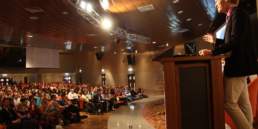AEGEE-Budapest has always been an antenna of superlatives. It has been one of the first locals founded In Central and Eastern Europe, always one of the biggest in the network and organised three Agoras. Zsuzsa Kigyós was one of the founders of the antenna, later she became the first female President of AEGEE-Europe and also honorary member of AEGEE-Europe. The Golden Times asked her how she remembered the founding years and the organisation of the autumn Agora in Budapest in 1991.
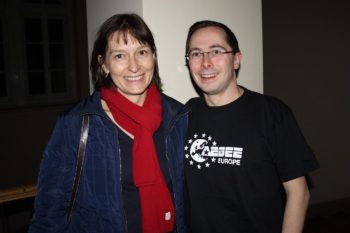
Golden Times: When and how did you hear about AEGEE for the first time?
Zsuzsa Kigyós: I heard about AEGEE – as far as I remember – at the end of the 1980s, at the university.
Golden Times: You were one of the founders of AEGEE-Budapest. How did it all start?
Zsuzsa: Until 1990 AEGEE was not present in Central and Eastern Europe. In that year the East-West Working Group of AEGEE-Europe, led by Rainer Emschermann, held a few introduction evenings at some universities, about what AEGEE is and why it would be a good to establish it in Budapest. At first it was established at the medical university in October 1990 with about 20 members. Some of them contributed more than I did at that time of the foundation and immediately afterwards. Let me highlight a couple of names: the external supporters were Rainer Emschermann, CD member Michael Merker and his AEGEE-Leipzig co-founder Krisztina Németh; the first president of AEGEE-Budapest was Éva Borka, supported by László Kreiner and Szabolcs Csapó.
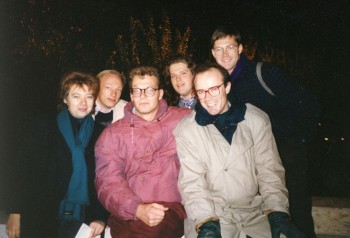
Golden Times: How was founding AEGEE-Budapest?
Zsuzsa: They were very exciting times – even if memories get always nicer with hindsight. We really enjoyed creating AEGEE-Budapest. It was something completely new for us, as we have hardly been involved in establishing an association. We identified different aspects every day such as legal aspects, financial questions and organisational decisions. In parallel with establishing the organisation we started to talk to people.
Golden Times: Did you easily get members?
Zsuzsa: Getting members was not difficult.
Golden Times: Hungary was in a deep economic crisis then. Was it easy for your members to travel?
Zsuzsa: It was shortly after the first free election and the lots of changes were taking place regarding the legal system and the economy. During this uncertain time, when inflation was high, the Forint was not convertible. So it was difficult to anyone to travel outside the country. We applied for several grants for our members to be able to participate on selected events. Also AEGEE-Europe applied for example for Tempus grants for certain events where the Eastern travellers were reimbursed for their trip.
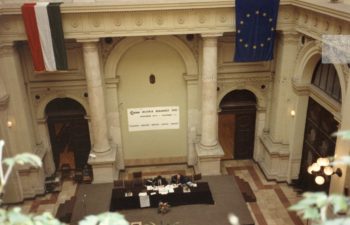
Golden Times: Was it hard for your antenna to fund events?
Zsuzsa: Organising events was of course difficult, as companies did not want to spend money on student events, but there were always some fellow members who could convince CXOs about the importance to use the event as a marketing opportunity.
Golden Times: How did the network react to the foundation of AEGEE-Budapest? With open arms or scepticism?
Zsuzsa: The establishment of AEGEE-Budapest was a great result of the work of the East-West Working Group. Of course on one hand there were some people who did not want us, but on the other hand we received really big support from others. The question, whether to establish Eastern local or not, generated lots of turmoil and discussions. People just could not leave this question without comments.
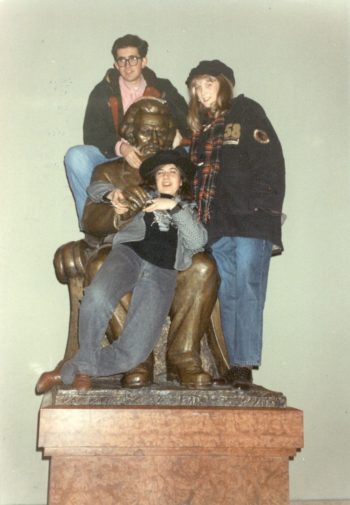
Golden Times: What was your antenna’s first event?
Zsuzsa: The very first event was an exchange with AEGEE-Eindhoven, followed by a Summer University in Budapest.
Golden Times: Only one year after founding AEGEE-Budapest your antenna organised the first Agora behind the former Iron Curtain. How did AEGEE-Budapest get this honour?
Zsuzsa: At the spring Agora 1991 in Amsterdam, where we became antenna, we were asked to apply as organiser for the autumn Agora of the same year! CD member Michael Merker, our great supporter, had his hand in it. Our supporters within AEGEE wanted to show to the sceptic members that an Eastern Antenna was able to organise such an event. This autumn Agora 1991 in Budapest was meant to become symbolic for AEGEE’s opening to the East. Therefore, we selected the slogan: “Students building bridges across Europe” for the event. In Amsterdam, we wrote our Agora application and handed in a very rough budget on checkered paper. Since most of us studied at the Economics University, today’s Corvinus University, it was not a big deal for us to put together a sketchy business plan. The figures didn’t have much to do with reality, but Michael and AEGEE-Europe President Georg helped us to get the right to organise the event.
Golden Times: What did your members in Budapest think about the idea and the fast execution?
Zsuzsa: We came back home and of course everyone thought this was a very bad idea. When we put together a more realistic budget, they considered the plan to be even worse. I think that in case of 200 applicants we would have needed 180 families to accommodate them, which was a very ambitious plan, taking into account the housing situation at that time. We managed to solve the problem with the help of lodging at our members’ homes and a students’ dormitory.
Golden Times: So you managed to convince everyone that it could work…
Zsuzsa: We managed to put together an organising team which was able to do almost anything. This team led by Petra Jakobsen. Under guidance of Vazul Tóth, who later became President of AEGEE-Budapest, we managed to get grants and in-kind resources collected from companies and universities. There was no major company that we didn’t contact! Gábor Szegedi tried to keep the finances under control. Kriszta Őry, who became the first CD member from Budapest in 1992, and Éva Borka were in charge of the contact with the universities. At the same time we tried to get press coverage – with success! The Hungarian Television MTV, the only TV station back then, interviewed us.
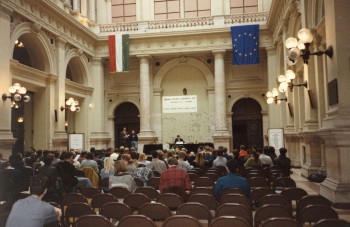
Golden Times: Amazing! Which problems or great moments did you encounter during the Agora organisation? Are there any anecdotes?
Zsuzsa: I guess on one hand we faced similar problems as today anyone who organises such an event. For example: lack of financial and human resources. On the other hand the Agora took place before the telecommunication boom. We did not have a direct phone line at the university, let alone a computer or e-mail! However, we managed to procure two big suitcase-size mobile phones which were the most advanced at the time, we did not even have a computer not to mention email. The whole organisation and communication was more difficult, but we managed to get some financing and in-kind support. Some of is managed to produce a computerised registration system that made each participant’s jaw drop. We also managed to get support by the then President of the Republic, Árpád Göncz. Our PR and marketing responsibles put together a very nice welcome package that everyone admired. We had more than 400 participants, which made it one of the biggest Agoras until then.
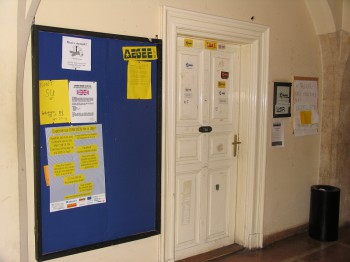
Golden Times: What was the effect of the Agora on AEGEE-Budapest?
Zsuzsa: After this our antenna grew a lot and within a year we had 400 members, which made is one of the biggest antennae. Of course, the Summer Universities and the Tempus Academy of 1992 contributed to the increase, but we had already a very active core. At that time we tried to get an office and wrote all kind of applications which might have helped us to apply for grants or any other support. The office question was a tough one.
Golden Times: How?
Zsuzsa: They put us in an office with several other student organisations. We hardly had any space, but we tried to spread ourselves as much as possible. There was no direct phone line. International telephones, faxes and later e-could only be arranged via the International Relations Department. Fortunately they were very nice to us. Originally we had to go there during their office hours in order to be able to use a small PC for our e-mails. Of course, these time constraints were not easy – so eventually we received a private office key. Of course, this was a great treasure!
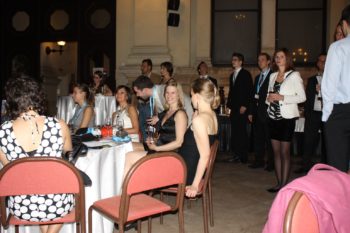
Golden Times: So you used to work there a lot?
Zsuzsa: I remember that when I spent three nights in a row in the office, in order to fax the multitude of Summer University applications, even I had enough. At this time e-mail was not like what we know today. It was used between universities, but there were hardly any personal accounts. However, AEGEE was quite a pioneer in using e-mails, because only two years later the whole communication was done via e-mail. In contrast, a few years later when I started working, the big investment banks in London still used a lot of faxes. The AEGEE Address Book was a great treasure. All important addresses were inside. I remember it was a big debate whether we should keep this sensitive information in the office at all.
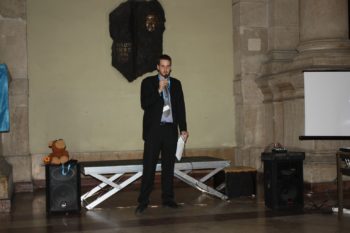
Golden Times: How did you communicate with your members?
Zsuzsa: The communication between our members took place in our office and on Tuesday nights in the university pub, the Közgáz Klub. We were presenting the events and activities in the office or during the meetings, where people could apply for them. We simply did not have a centralised communication channel, such as e-mail. Organising anything without e-mail and mobile phones might sound like the Stone Age, but we managed – with great enthusiasm and success.
Golden Times: Did you also help creating antenna in the neighborhood?
Zsuzsa: I shared our experiences with some other locals and when I was a CD member then also helped with organising events and obtaining grants especially from Tempus to the event.
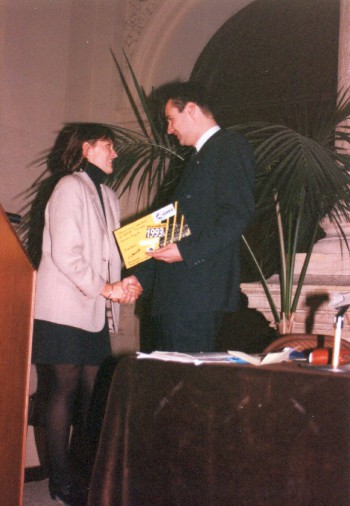
Golden Times: Later you joined the CD and became President of AEGEE-Europe. How do you remember the East expansion of AEGEE in that time?
Zsuzsa: First I was responsible for the Eastern version of the student mobility program Tempus. At that time it was my role to discuss with our Eastern locals and also to help them if they needed anything regarding the mobility program. During that time the Eastern countries opened up more and more locals joined the AEGEE family.
Golden Times: Anything else you’d like to add?
Zsuzsa: I think AEGEE is a great organisation, it sets some borders and principles but the actual day-to-day operation always depends on the active members. Therefore, I think we can call it an organisation with thousand faces. I wish that many more young people will be able to enjoy the possibilities that AEGEE offers!
Related Posts
1st August 2019
The Gallery of All Presidents of AEGEE-Europe
Here is the gallery of all Presidents of AEGEE-Europe - with photos of every one of them. Enjoy the list!

